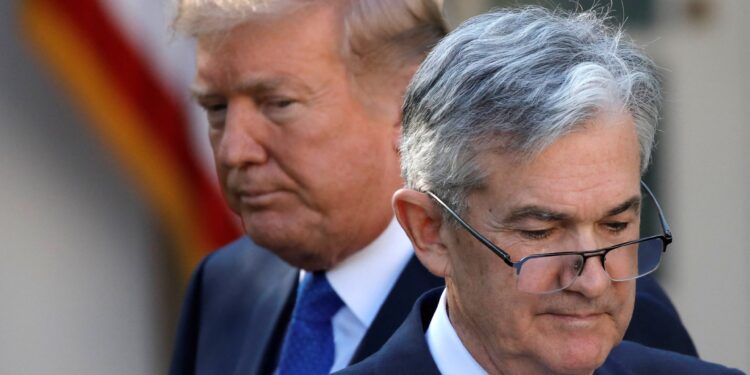The US Federal Reserve (the Central Bank) is heading to a collision path with President Donald Trump, with a intention to keep interest rates unchanged, in his upcoming decision this evening, despite the president’s calls to reduce the costs of borrowing “in a great extent,” according to the British Financial Times newspaper reported For experts.
The US Central Bank’s decision today, Wednesday, (regarding the interest rate) is the first of its kind on monetary policy after Trump returned to his post, a return that witnessed a series of executive orders in light of the US President’s endeavor to impose his agenda on Washington.
Analysts say that the head of the Federal Reserve (Central Bank) Jerome Powell will have to resist the pressure of the White House if he wants to retain the trust of the markets and avoid launching a new wave of inflation.
Bank independence
The newspaper quoted the senior economists of the New Sinshri Advisers and a former official at the Federal Reserve Bank, Claudia contributed, saying: “When the presidents begin to interfere in monetary policy decisions, things may often get worse.”
She added: “Reducing interest rates with no reduction in inflation to the targeted level may create more inflation. There is a reason that makes the Federal Reserve independently,” expected to “adhere to the central bank with its goals.”
Powell helped direct the American economy to a calm decline during the past year, as it restrained the high prices without pushing the economy to recession.
But inflation is still higher than the central bank of 2%, although it slowed enough to allow the Fed Back to reduce interest last year by a percentage to a range of 4.25 to 4.5%.
While the market is widely expected that the federal reserve will keep the interest rates fixed todayandTrump made it clear that he wanted much faster discounts.
President Trump said last week: “I think I know interest rates much better than they know, and I think I definitely know her much better than the person responsible mainly for making this decision … I would like to see (interest rates) fall a lot,” President Trump said last week.
Reverse interventions
For his part, Lawrence Samers, who served as the Treasury Secretary during the era of President Bill Clinton, says that such “public interventions by governments can be inverse (influence) … Federal Reserve will not listen,” according to the Financial Times.
Central banks in various parts of the world were given full control over the determination of interest rates after the inflation wave during the seventies and 1980s demonstrated the difficulty of taming them in an environment where political intervention in monetary policy was common.
“Now that Trump has called to reduce interest rates, if the Federal Reserve reduces his monetary policy, it will create the impression that they surrendered to him and lost their independence,” said Ezabella Weber.
The US Central Bank is scheduled to reduce the interest less severe than its counterpart in the euro area this year.
The possibility of the US economy being exposed to several price shocks – including those raised by Trump – may delay the two discounts that most of the Federal Reserve and Market officials expect this year.
Some believe that the Trump administration plans for customs tariffs and tax cuts, as well as potential growth in economic activity and markets, will prevent lowering borrowing costs (interest) in the United States.
Away from politics
According to the newspaper, the central bank itself is keen to reduce tensions with the White House. Powell is expected to avoid policy questions and avoid Trump’s name in his press conference after today’s meeting.
Economists expect that the head of the Federal Reserve Bank will abide by the bank’s approach, stressing that the users of interest rates will follow the data, instead of trying to expect the impact of Trump’s policies.
“Powell does not want to talk about politics,” said Vincent Rinhart, the chief economist at BN Wai for investments and a former federal reserve official.



